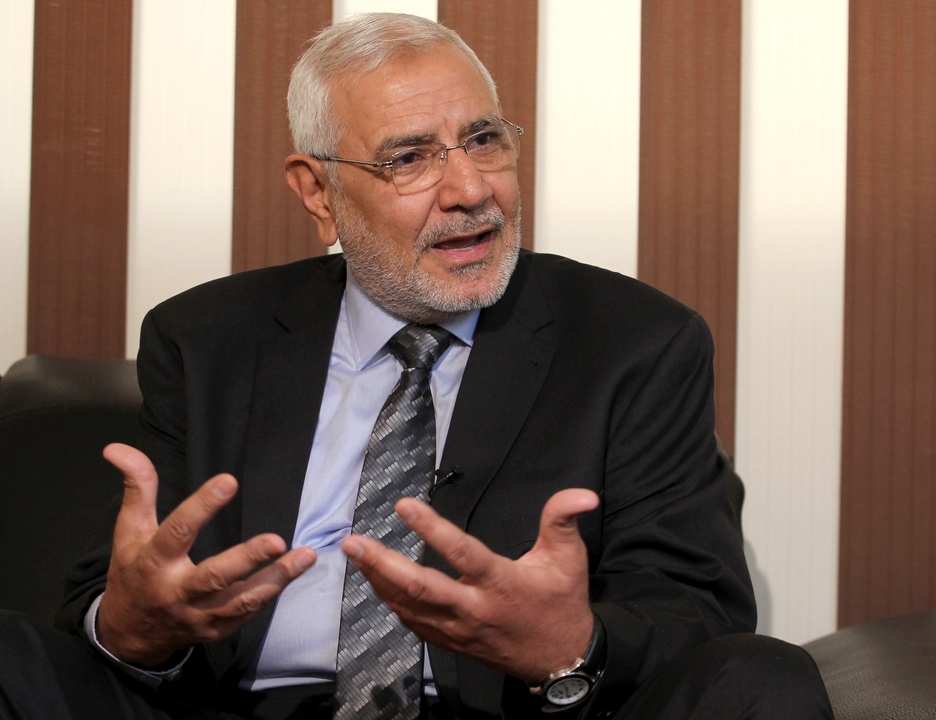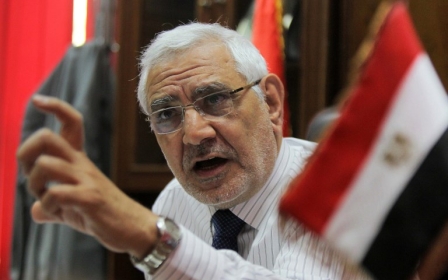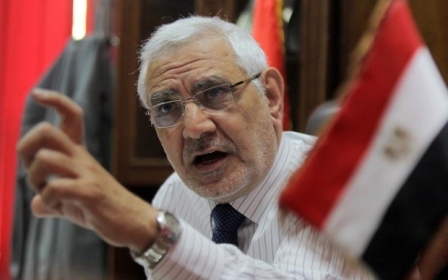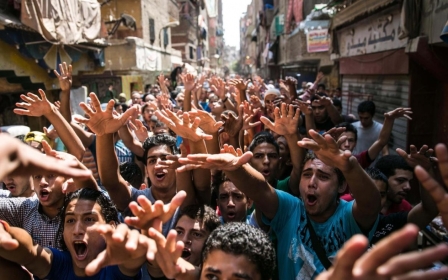Egypt adds ex-presidential hopeful Abul Fotouh to terrorism list

An Egyptian court added former Egyptian presidential candidate Abdel Moneim Abul Fotouh to a terrorism list on Tuesday, following his arrest for allegedly having contacts within the outlawed Muslim Brotherhood group.
Abul Fotouh, a former Muslim Brotherhood member who now leads the Strong Egypt party, was arrested last week a day after returning from London, where he had given interviews sharply critical of President Abdel Fattah al-Sisi ahead of next month's presidential election.
The interior ministry said at the time that Abul Fotouh held secret meetings with leaders of the Muslim Brotherhood while in London to implement a plot to stir unrest and instability in the country, accusations he denied.
During a recent interview with Al Jazeera, Abul Fotouh condemned Sisi's crackdown on opposition figures and said the upcoming presidential elections were not fair, transparent, or "democratic".
Sisi is almost guaranteed to win a second term in a presidential election slated for 26-28 March, but the vote has been criticised by rights groups after several prospective candidates called off their campaigns, citing intimidation, and a top challenger was arrested.
The electoral commission has said that it will ensure the vote is fair and transparent.
Abul Fotouh was among the first of several high-profile Egyptians to call last month for a boycott of the election.
Individuals added to the terrorism list are subjected to an asset freeze and a travel ban and are permitted 60 days to appeal the decision.
Abul Fotouh's lawyer, Abdelrahman Haridy, told Reuters he was not notified of the court's decision but that the designation could "easily" be appealed in court.
"It's clear that there is an insistence on tacking charges on to political figures to intimidate all politicians, even for just saying their opinions," Haridy said.
Abul Fotouh along with 15 others were added to the list after an investigation by the state security prosecution found they had joined an outlawed organisation "aiming to harm the interests of the state", state news agency MENA said, without naming the organisation.
In an interview with Al Jazeera Mubasher, a Qatar-based channel banned in Egypt, Abul Fotouh last week criticised Sisi in unusually pointed terms, accusing him of pulling the army into politics, failing to curb deadly attacks by Islamist militants and mismanaging the economy.
"A boycott of this mockery is a duty, in our opinion, because we don't accept for Egyptians to participate in a farce," Abul Fotouh told Al Jazeera.
“I didn’t nominate myself as a candidate because there are no real elections happening in the first place.
"There is no real candidate [in the Egyptian elections] apart from the current president, Abdel Fattah al-Sisi. Where’s the opposition?
"Even the opposition they provided five minutes before the deadline for candidate registration, he’s a supporter of Sisi. So there’s no real opposition, therefore this is not a real election.”
The 66-year-old doctor left the Muslim Brotherhood in 2011 after disagreements over the role of religion in politics and founded the more centrist Strong Egypt party in 2012.
He mounted an independent bid for the presidency in 2012 and took nearly 18 percent of the vote in the first round of elections.
Egypt banned the Brotherhood in 2013 after the military ousted President Mohamed Morsi following mass protests. The group has since been declared a terrorist organisation by the government, but it maintains that its activities are peaceful.
Stay informed with MEE's newsletters
Sign up to get the latest alerts, insights and analysis, starting with Turkey Unpacked
Middle East Eye delivers independent and unrivalled coverage and analysis of the Middle East, North Africa and beyond. To learn more about republishing this content and the associated fees, please fill out this form. More about MEE can be found here.




